Eugene 2024 mayoral candidates outline platforms, priorities on housing, transportation
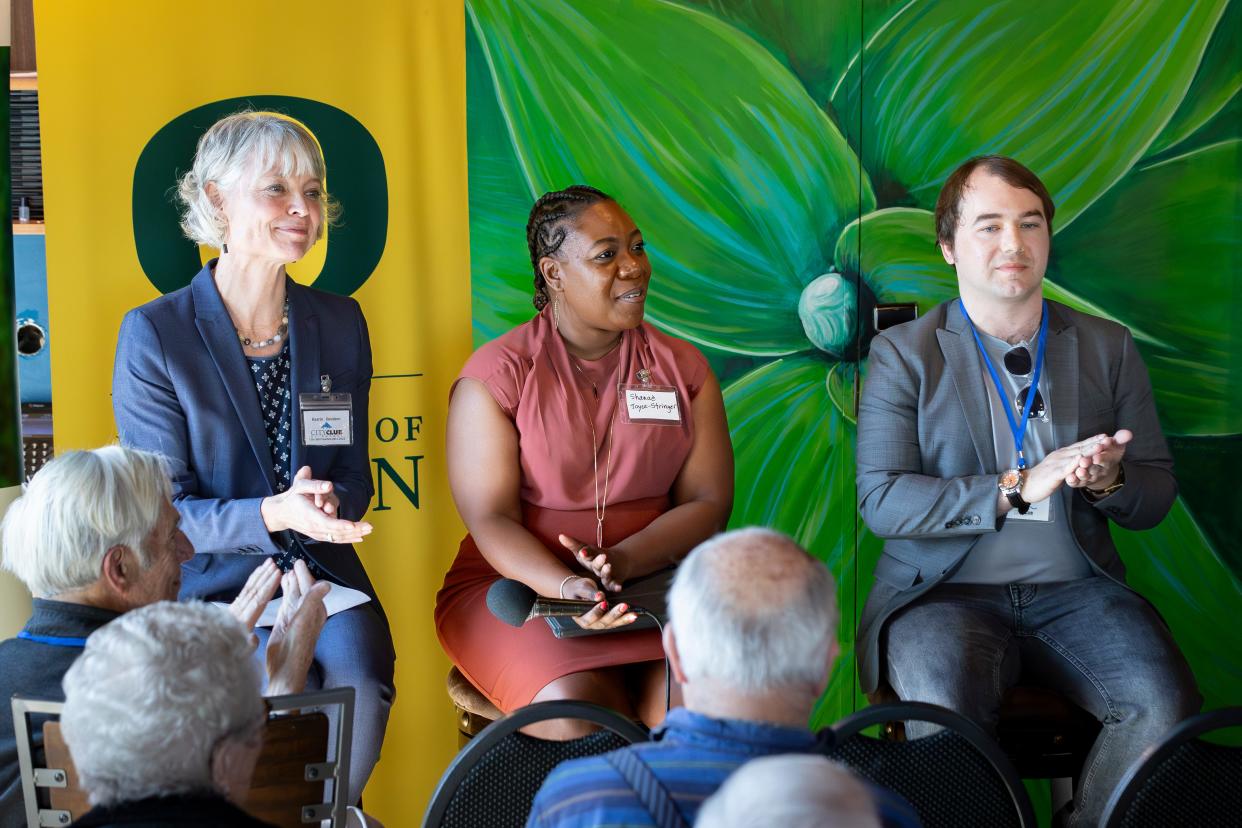
The three candidates running to be Eugene's next mayor fielded questions Friday from KLCC reporter Rebecca Hansen-White at a City Club-hosted forum, addressing topics such as housing costs and homelessness, property crime, and the city's budget.
Eugene Mayor Lucy Vinis is not seeking a third term, and three Eugene residents are running to replace her. Tuesday, April 30, is the last day to register to vote, and the Lane County elections office is expected to mail ballots starting around Thursday, May 2. Ballots are due Tuesday, May 21.
Eugene's mayor is a nonpartisan office, meaning the primary will appear on the ballots of all Eugene voters regardless of party. If a candidate earns a majority of the vote, they will run uncontested in November. If no candidate earns a majority, the two with the most votes will run head-to-head in November.
Opening, closing statements from Eugene mayoral candidates
In the parts of the forum where the candidates could talk about themselves, candidates highlighted their sources of experience and the initiatives they would prioritize as mayor.
Kaarin Knudson highlighted her experience as "an architect, educator, housing advocate and small business owner." She said this background would let her address Eugene's housing crisis with "sustainable urban design." She also promoted her endorsements "of more than 200 community leaders all across Eugene," including the last two mayors, "as well as other electeds in environmental business, housing, labor and education organizations."
Artist Stefan Strek promoted his proposal to create a tax exemption for home repair for seniors and was the most critical of Eugene's existing leadership. "I want to encourage everybody, literally starting today, hold people in government accountable for what they say they're going to do," he said.
Shanaé Joyce-Stringer described her job "as an educator … small business owner and community advocate." She highlighted her work in philanthropy and community outreach. "Because I've created access to opportunities and resources for so many young adults and families in the community, I've been able to establish partnerships," she said. Outreach that will help her "ensure that every voice is heard and that every resident is represented."
Candidates for Eugene mayor highlight senior, disability initiatives
In response to the AARP-sponsored question of the forum, each candidate highlighted initiatives they said would help seniors and people with physical disabilities.
Knudson highlighted her desire to increase Eugene’s housing stock and said that as the city does so, it should ensure enough of those houses are affordable to retirees and physically accessible. Knudson also said she wanted to improve the design of the city’s public spaces, “so that we're ensuring that the fabric that literally knits our neighborhoods and families together is accessible.”
Joyce-Stringer gave a similar answer focusing more on existing homes. She said she wants to provide resources to seniors to make their homes more accessible and improve the accessibility of Eugene’s recreational opportunities. “I believe in equity and equity is also inclusive of the variation in ages that exist in this community,” she said.
Strek highlighted his plan to create a senior-focused tax credit for home repairs. “I do believe that it shouldn't be so hard for the city to provide a credit for people, (through) local property taxes to help mitigate the expense of maintenance and help retirees really have a higher quality of life in their homes,” he said.
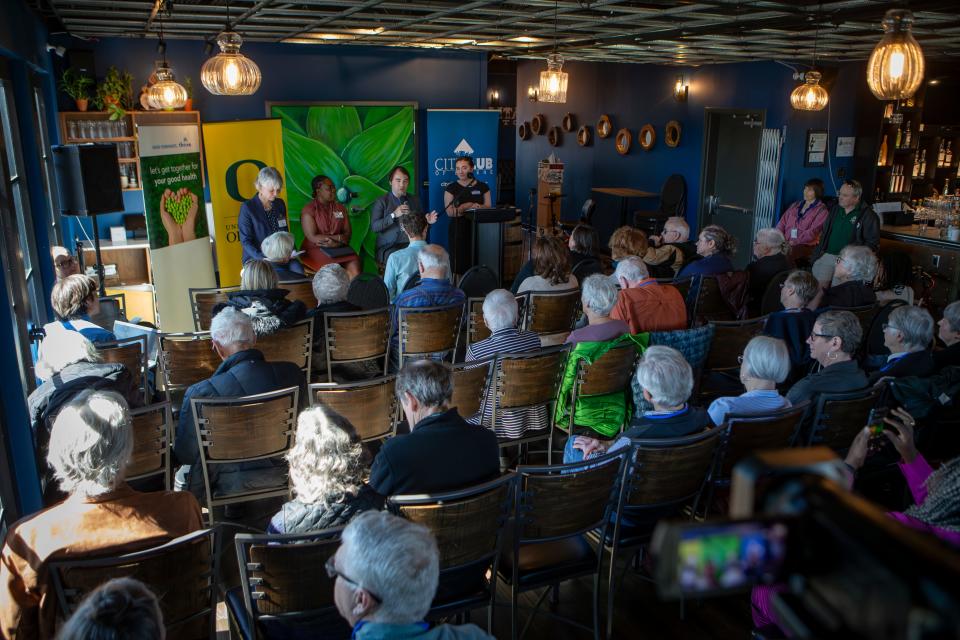
Public engagement
In response to Hansen-White's question, "How will you ensure that people of all age groups, people who are marginalized voices and other people impacted by decisions are included and their voice is heard in City Hall?", each candidate laid out plans to seek and incorporate public engagement.
Joyce-Stringer said she wanted to go out personally to look for community feedback. "I want to go out to where people are. I don't believe in just sitting and waiting for those to come into the city hall to be heard," she said.
Strek focused on Eugene City Council public forums and criticized the city's recent change to reduce the time per speaker from three minutes to two minutes and thirty seconds. "That's pretty disrespectful of the citizens, and I'd like to increase that time so everyone can get their concerns out and really address public issues."
Knudson praised the city's approach to redesigning local housing regulations and said she would like to reuse that process for other issues. "That work included essentially the assembly of a demographically representative, lottery-selected citizen review panel. And that panel set the values and the trajectory of the housing reform work that we were going to do locally," Knudson said.
Housing costs in Eugene
Each candidate outlined a different approach to increasing housing affordability.
Strek answered the question by talking about crime, implying that by reducing crime, more businesses would open and people could earn and afford more. "It really hurts to see so many local businesses closing down because of crime and just disrespectful activities," he said. "We really can help everyone afford more if people feel safer."
Knudson said she's already been working to improve the city's housing policies and said the path to making housing more affordable was to "align our housing production broadly with our communities, housing needs." This would include increasing the city's investment in permanent supportive housing and other subsidized affordable housing and working to ensure market-based housing "is aligned to what our community needs and is providing stability and opportunity and financial equity."
Joyce-Stringer said she wanted to increase the city's Construction Excise Tax that goes to the city's affordable housing fund, as well as work with the city's advisory boards and developers. "I also want to work with both current developers and new developers that will come into our community and look at how are we creating truly affordable housing units and making sure that (our rental rates) are not outpacing (median income)."
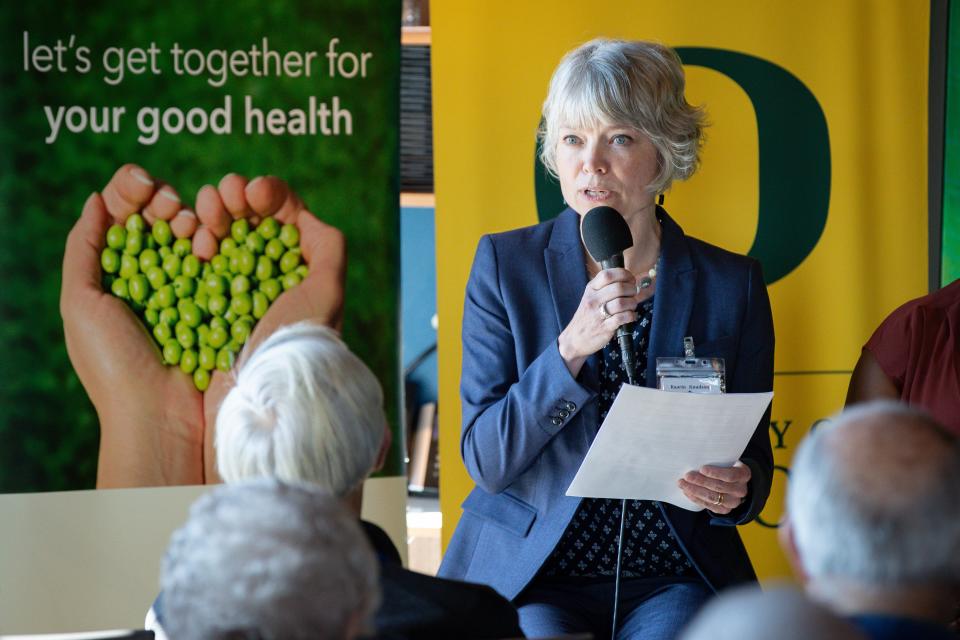
Homelessness
Each candidate outlined their strategy for addressing homelessness. Knudson and Strek both focused on housing affordability, with Knudson suggesting an approach that combined more subsidized affordable housing with more middle housing and Strek emphasizing a greater public sector role. Joyce-Stringer focused on improving access to shelter.
"Our primary challenges as they relate to homelessness has to do with the fact that our community does not have enough housing that people can afford," Knudson said, describing a strategy that would include more permanent supportive housing, more compact housing and more housing that targets people earning between 80% and 100% of area median income.
Joyce-Stringer focused on ways to increase shelter beds. She said there are city regulations preventing shelters from opening or expanding that she wants to get rid of and that she wants to generate more funding for shelter. She highlighted Senate Bill 1530, which included $65 million statewide for emergency shelters, and said she would use the mayor's platform to push the state for more legislation like it.
Strek focused on housing affordability and criticized what he saw as the city's approach of trusting housing development to the private sector. Later in the forum, he cited 1059 Willamette and the former EWEB steam plant as examples. "There's been a lot of waste, a lot of money that's just been shredded by private corporations," he said, implying projects like these should be done by the public sector instead, "The government can do more."
Transportation
All three candidates said they wanted to improve access to transportation models besides driving, and highlighted different ways to achieve that.
Joyce-Stringer praised the city's work with the road-bond-funded Move EUG walking and biking safety projects and said she wanted to look for revenue sources for more projects like those. She also said she wanted to add more bikes to the PeaceHealth bike share program, look for a partner to bring back Eugene's electric scooters, and work with Lane Transit District to train bus drivers to reduce their shortage and expand routes and trip frequency. "We know that they're experiencing a shortage of drivers. But there is something we can do to help them," she said.
Strek focused on LTD, saying he wanted to increase resources to the district for it to expand routes into neighborhoods, to the airport and at more times of the day. "I don't see why 24 hours a day is inaccessible," he said. Strek said that he believed this expansion would encourage economic development in Eugene. "This will bring better companies with more jobs and really keep everything going forward," he said.
Knudson also mentioned LTD but focused on urban design, saying she wants to work to design the city to make it easier and safer for people to walk and bike, in part by putting their destinations within walking distance of neighborhoods, and increasing the frequency of buses. "We are using an operating system that is from 1945," Knudson said, comparing the transit network to a software system. "It's time to upgrade."
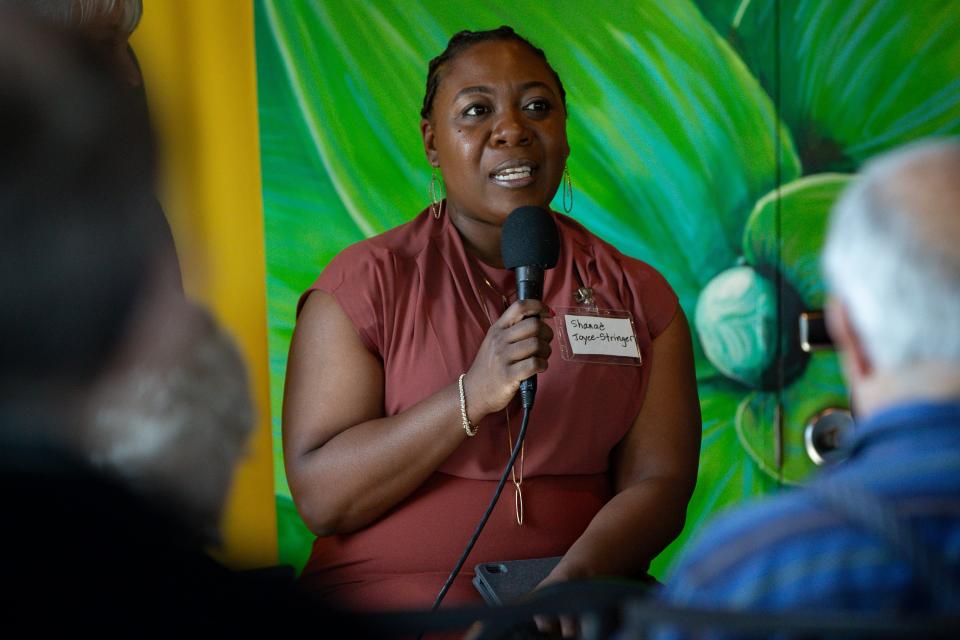
Property Crime
When asked how they would reduce property crime in Eugene, each candidate outlined a different strategy.
"Property crime comes in large part from desperation," Strek said. He criticized the city for shrinking the role of CAHOOTS and said that the city could reduce property crime by expanding CAHOOTS' role and by developing more affordable housing. "If people have housing which is actually within their budget, they wouldn't be on the streets. They wouldn't be incidentally, literally forced to commit crime to survive."
Knudson said she would develop a strategy to reduce property crime by "working with our local business communities, with our police, with our emergency response systems, with everyone who is a part of this system." She said these groups would help her to understand why and where they're seeing property crime "and what can we do to compassionately, effectively address this problem."
Joyce-Stringer also called for an analysis and said the city should use that to address the root causes of property crime. She said she wants to both increase access to social services, shelter and housing, and expand police visibility. "I'd love to see our cops and officers outside of their cars really engaging with the different residents that they are patrolling," she said. When "our officers are more visible, there's definitely greater connection."
Budget
When asked about their approach to budgeting, all three candidates criticized the decision last budget cycle to cut funding to the library. Knudson and Joyce-Stringer outlined the criteria they said they would use to assess what to cut, while Strek instead blamed the city's budget gap on mismanagement.
Knudson said when the city needs to shrink its budget, she'll prioritize both "the basics" and "ongoing investments" as things to maintain. Knudson said the library is an example of something the city should fund under that ongoing investment category. "Making sure that our public library remains accessible to people and that those services are available across our community is an incredibly important investment."
Joyce-Stringer said her approach would be similar to Knudson's. She said the city should analyze the services being offered and keep what's most essential. "What is going to invoke some gains for the most and meet the needs of most in our community? And let's prioritize those things," she said the library and minimizing layoffs are two examples of things she would prioritize.
Strek said he didn't believe the city should have to reduce services and blamed the city's budget shortfall on mismanagement. "The city has a lot of money," he said. "There's no reason we can't have a 24-hour library with access," he said. Instead, Strek said the city should look to cut waste. After the forum, he told the Register-Guard the city's process toward developing a new city hall was an example of that waste.
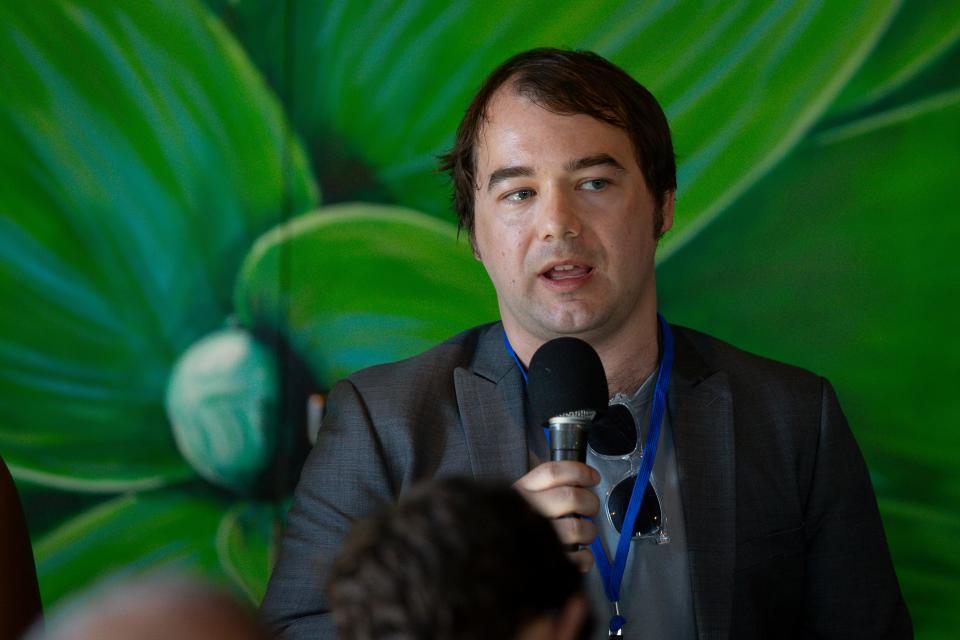
Eugene Emeralds minor league baseball stadium
When asked for their views on the City Council's decision to send a bond to partially pay the Emeralds Stadium/multi-use facility to voters, Joyce-Stringer and Strek were both critical of the project, while Knudson maintained neutrality.
"We are in a budget deficit currently and I believe that we need to serve the needs of the communities that provide all the essentials for our residents," Joyce-Stringer said. She pointed to the closure of the University District Hospital, suggesting the city send out a bond to build a new hospital instead. She said she still wanted to look for a different way to keep the Emeralds in Eugene, "but our money needs to go to the needs of our community right now."
Strek similarly said he was skeptical of the project. "I don't want to say they don't deserve a stadium at all, but now it's like somebody breaks their things and then just wants a new one," he said, alluding to Civic Stadium. Strek also said he disagreed with the proposed location. "From what I've heard, there's better options to make this happen for everybody," he said.
Knudson declined to take a stance on the project and simply encouraged Eugene residents to vote. "That will be a decision in front of voters on May 21st," she said. "And I would encourage everyone to vote and be engaged in that election coming up."
Climate resiliency
Each candidate provided unique answers to Hansen-White's question, "As climate change brings more severe weather like ice storms and wildfires, what would you do as mayor to make our city and our region more resilient and more effective when responding to climate emergencies?" Strek focused on retaining public assets. Knudson discussed urban planning for climate resiliency. Joyce-Stringer focused on reducing emissions.
Strek reiterated his concern about outsourcing development to the private sector, saying that the city should retain public assets like the former steam plant for public use, which could include emergency preparedness. "If it's profitable for someone to privately buy that and put the investment in for private use, why couldn't this land have been used for public benefit?" he said.
Knudson highlighted her urban planning background. "As someone who's focused on sustainable urban design, this is central to the work that we have before us," she said. Knudson said as Eugene faces climate disasters, "We'll be challenged to address those emergencies that are immediate, while also steering towards a future that is more sustainable and resilient and enacting long-term change. And I'm committed to leading that work."
Joyce-Stringer focused on reducing emissions. She praised the city's Climate Action Plan and said she was committed to its goal of halving Eugene's emissions in 2030 compared to 2010. "It's going to have us review policies that are already in existence, but also the creation of policies to make sure we are creating a sustainable living environment." Joyce-Stringer also said she wants to provide buffers between residential and industrial zones.
PeaceHealth's closure of University District hospital in Eugene
When asked how they would respond to the University District hospital closure as mayor, all three candidates said they wanted to work with health care providers to bring its services back to Eugene. Knudson envisioned clinics that would offer the hospital's services, while Joyce-Stringer and Strek envisioned a new hospital.
Knudson said as mayor she would work with other health care providers to provide the services University District was providing. She listed services to respond to sexual violence, trauma, behavioral health and mental health support, as resources she wants to bring back. "That will mean new partnerships. We'll be thinking about how clinics can expand or specific clinics can be offered. But it will be the work of the next ten years to build back," she said.
Joyce-Stringer and Strek were both more optimistic about the chances of bringing a new hospital to Eugene, which they said they would work toward as mayor.
"I know that we can leverage those resources we have together in order to engage in a conversation to restore the existence of a local hospital with an emergency room here," Joyce-Stringer said.
"Fortunately, we have a variety of health care providers in Eugene, and it shouldn't be so difficult to open a conversation for someone to fill that missing but vital and very necessary role, whether it's PeaceHealth or another group," Strek said.
First order of business
Joyce-Stringer said her first order of business as mayor would be to engage with the current city government leaders, while Strek and Knudson said they would get started right away on their desired initiatives.
"I want to engage with those who are currently doing the work in the first 30 days," Joyce-Stringer said. Having that conversation with our city manager is going to help prioritize what those days after those first 30 look like.
Strek repeated his desire to create a senior-focused home-repair tax credit. "It's really just something that is simple and everyone should be able to agree with.
Knudson repeated her desire to focus on housing. "I'm absolutely committed through all of 2024 and beginning on January of 2025 to work to announce new housing initiatives, to put new programs in place, to develop stronger partnerships with our county and state partners. Because that is how we address the structural crisis that is presented," she said.
To listen to the full forum, visit https://www.klcc.org/show/city-club-of-eugene/2024-03-18/city-club-of-eugene-eugene-mayoral-candidates.
Alan Torres covers local government for the Register-Guard. He can be reached over email at atorres@registerguard.com or on X @alanfryetorres.
This article originally appeared on Register-Guard: Election 2024: Candidates for Eugene mayor discuss priorities

